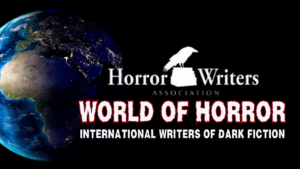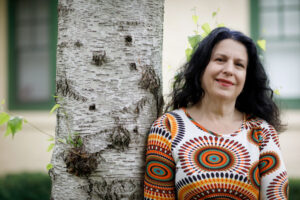World of Horror: Interview with Kaaron Warren


Shirley Jackson award-winner Kaaron Warren has published five novels and seven short story collections. She’s sold over 200 short stories to publications big and small around the world and has appeared in Ellen Datlow’s Year’s Best anthologies. Her novel The Grief Hole won all three Australian genre awards. She has lived in Melbourne, Sydney, Fiji and Canberra and her most recent books are The Deathplace Set in Vandal, and Bitters, a novella from Cemetery Dance. She won the inaugural AsylumFest Ghost Story Telling Competition in 2022.
What was it about the horror genre that drew you to it?
Even as a child I was drawn to ghost stories. There were no Goosebumps, but there were The Three Investigators, who tracked down screaming skulls and talking clocks. (Or perhaps it was the other way around!) Those books gave me momentary chills. There were macabre comics about the living dead and haunted attics. There was V.C. Andrews’ Flowers in the Attic, and Rebecca, and any gothic or spooky book I could lay my hands on.
I love the thrill of being scared while knowing I’m safe. Something activates in the brain for me, and it opens up. I remember being at Girl Guide’s camp when I was ten or eleven. A few of us decided to play the “she’s as light as a feather” game, something we’d been specifically told not to play. One person lies down flat on the floor, and the others surround her, all placing two fingers underneath her. You chant and repeat, “She’s sick. She’s dying. She’s dead. She’s as light as a feather,” then try to lift the “dead” girl. I just googled to see if this game had a name and discovered it was first mentioned in Pepys’ diary in 1665!
Our supervisor caught us and said something that chilled me to the bone: “What if something happened, and you never got back to your body?”
I loved playing dead the most, hoping that by the pure power of my imagination I could send my soul away, if only for a moment, and I could see all their faces as they lifted me.
It never happened, of course, but that’s what I’m trying to capture in fiction and why I love horror. The soul can leave the body, and observe. It’s up to me if that soul is evil or kind, and how the story ends. Do they get back to their body or not? I love that combination of freedom and control that horror writing gives you.
Is there a horror tradition in your country, in your culture? A taste for horror, a market? Not necessarily literature; perhaps oral tradition too.
I’m not qualified in any way to talk about indigenous culture and the stories told, but it is a tradition of many thousands of years. Here’s one article, written by Jacinta Koolmatrie, an Adnyamathanha and Ngarrindjeri person.
https://australian.museum/learn/first-nations/yamuti/
Post Colonisation/Invasion, there is a grand tradition of horror stories. Two of the best references for material are Macabre, edited by Angela Challis and Marty Young, from Brimstone Press, and James Doig’s Australian Gothic.
From John Lang’s “Fisher’s Ghost” (inspired by a true story) to Marcus Clarke’s “Hunted Down,” Henry Lawson’s “The Ghostly Door” and Barbara Baynton’s “The Chosen Vessel,” these early white writers looked at fears of being lost in the outback or the bush. Of being out of place and out of time (which they surely were) and at the universal themes of love, loss and fear of death.
There was the era in the 1960s, when Picnic at Hanging Rock by Joan Lindsay was published, where stories played with the old fears and introduced new ones.
Over it all are the oral tales, the campfire stories of bushrangers, ghosts, gods and demons.
Who are some of your favorite characters in horror, internationally and/or in your own culture?
This is a really tricky question because the list could go on forever! I’m going to choose two I’ve loved recently. These characters I came to know very well because they appeared in the anthology Vandal, from Crystal Lake, part of their Dark Tide novella series. Aaron Dries, J.S. Breukelaar and I all contributed novellas.
So:
- The utterly terrifying chalk-figure men in Aaron Dries’ We Called it Graffitiville.
- The witch Eva from J.S. Breukelaar’s Quicksilver, with her “backwards-facing knees and her yolky drool” filled me with dread.
But also:
- Richard Harland’s Vicar, from his classic novel The Vicar of Morbing Vyle, had me laughing, cringing, crying, recoiling, all at the same time.
- Margo Lanagan has created many memorable characters, but I think my favourite is Liga in Tender Morsels. So much suffering, so much power. This is a book I had to stop reading a number of times to settle myself.
Do you make a conscious effort to include characters and settings from your country in your writing, and if so, what do you want to portray?
I don’t make a conscious effort but am naturally affected by my environment. When I lived in Fiji for three years, my stories were all Fiji inspired, both setting and character, although I wrote them from an outsider perspective (a Fijian who has lived in Australia for decades and returned home, an Australian woman teaching art, an Australian woman hunting rare dogs).
At home, my stories are very Australian in language and tone. I don’t set out to portray anything in particular beyond trying to be as “real” and believable as possible. I’m just telling the story in the way it presents itself to me.
What has writing horror taught you about the world and yourself?
This is such an insightful and important question. Whenever I’m asked why I write horror—and aren’t we all asked that often?—part of my answer is “because it helps me to try to understand what the hell is going on.” The world, people and the things they do, fate, luck (good and bad), entropy, decay and birth; we look all of this in the face in horror. We go to places other writers perhaps don’t go.
What I’ve learnt about the world: Nothing really changes. People are people and will make poor choices, or good choices that turn bad. Pure evil needs an explanation and a level of understanding (and I don’t mean empathy or acceptance) otherwise don’t write about it.
About myself: that I’m fearful of many things, and no matter how much I face them, these fears remain. That my greatest fear is the loss of my loved ones. And second to that, the fear of causing the loss of loved ones through my own actions.
How have you seen the horror genre change over the years? And how do you think it will continue to evolve, both in the U.S. and in your country?
You can see it in the language used, the way “othering” has changed, in the awareness of inclusiveness of all authors and in the characters in stories.
Basic fears and horror stories, though? Unchanged over millennia. We are scared of the same things. There are trussed-up bodies from the Palaeolithic period. People scared of the dead rising? We have always feared the unknown, the dark, wild animals, death, loss, violence, ghosts, the afterlife and who might crawl out of it.
I’m proud to be part of a genre that can embrace better ways of communicating these fears. That we no longer need to use aggressive, abusive, racist, ableist, sexist, homophobic language in our work (unless deliberately creating a monster who speaks in that way).
How do you feel the International horror writing community has been represented thus far in the market, and what hopes do you have for representation going forward?
Australian horror is represented quite poorly, at least in the local arena as far as bookshops and literary festivals go. It’s hard to get horror on the shelves, and almost impossible to find horror represented in any festival outside the spec-fic world. There is a powerful prejudice against us, a massive misunderstanding of what we do.
You would hope the TV and movie successes would lead to greater acceptance, but I’m not sure it will.
Who are some international horror authors you would recommend?
Australian horror has been strong for many years, going back to the ‘80s when Terry Dowling and Robert Hood first started selling their work. We’re stronger than ever—new writers coming through who are demonstrating a control over material and an originality in voice. Here’s a list of just some, and I apologise to the many I’ve missed.
Terry Dowling, Robert Hood, Stephen Dedman, Andrew McKiernan, Kirstyn McDermott, Jason Nahrung, Kyla Ward, Alan Baxter, Martin Livings, Angela Slatter, Joseph Ashley-Smith, Aaron Dries, J.S Breukelaar, Angela Slatter, Lisa Hannet, Garth Nix, Zachary Ashford, Pamela Jeffs, Geneve Flynn, Trent Jamieson, Matthew R. Davis, Matt Tighe, Chris Mason, Emma Osborne, Deborah Sheldon, Greg Chapman, Andrew Cull, Jason Franks, Rebecca Fraser, Lauren Daniels, Kyla Ward, Anthony O’Connor, Joanne Anderton, Maria Lewis.
A great starting point are the shortlists for the Ditmar Awards, the Australasian Shadows Awards and the Aurealis Awards.
What is one piece of advice you would give horror authors today?
Write it all down. The blips of ideas, the moment of inspiration, the snippets of conversation. Then, when you find the time to write, you’ll have something to start with. Nothing worse than staring at a blank page with available time ticking away.
And to the writers from your country out there who are just getting started, what advice would you give them?
Get to as many events as you can. Connect with writers online and in person if you can. Support book launches and readings. I call it “Bums on Seats”!



